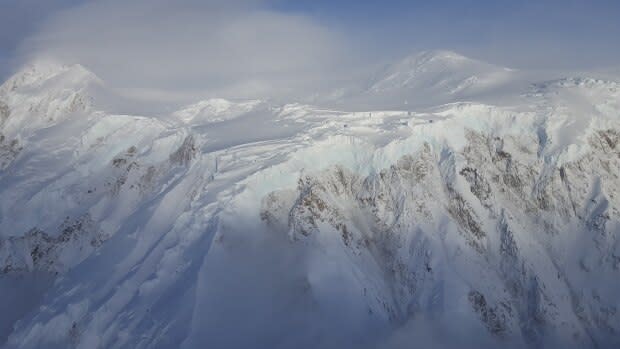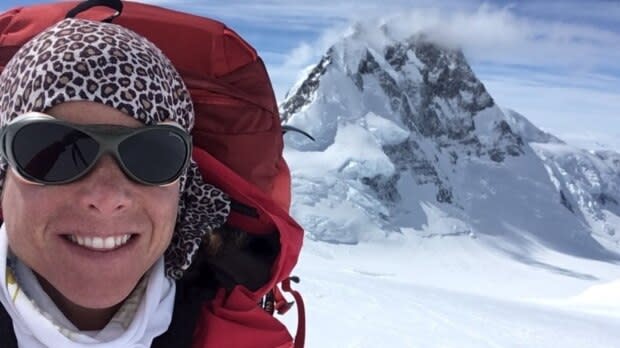Behind the scenes of the rescue of the last solo climber on Mount Logan
UPDATE: This story was updated on Jan. 27 to include a response from Monique Richard and to add the cost of the rescue.
At 6:45 a.m. on June 1, 2018, Monique Richard called Parks Canada for help.
The Quebec mountaineer was in her tent, 5,550 metres up on Mount Logan. The batteries on her communication device were getting low, and she was running out of food and fuel.
Richard was cold and exhausted. She hadn't slept since reaching the summit two days before.
She was the first woman to reach Canada's highest peak on her own — and may have been Mount Logan's last solo climber.
This winter, Parks Canada put a moratorium on solo climbing expeditions on the mountain, citing dangerous and expensive rescue missions.
Documents obtained by CBC News through an access to information request detail what happened behind the scenes of Richard's rescue in 2018.
The mountain
Mount Logan is located deep in Kluane National Park and Reserve in Yukon.
All climbers need to apply for a permit. The application form says mountaineers need to prepare for extreme conditions, including storms, strong winds, zero visibility and temperatures below –40 C.
The form says between 1973 and 2015, about 4,000 climbers and skiers visited Kluane's icefield ranges, and 15 people died.
Richard is an experienced climber who's completed the Seven Summits — meaning she's summitted the highest peak on each continent.

In a written statement to CBC, she called Logan her most significant achievement as a mountaineer. But something went wrong on her descent.
One note in Parks Canada's rescue incident report says she "gave up." Another internal email cited fatigue.
June 1, 2018, 6:45 a.m.
After Richard called for help, rescue plans quickly formed. Kluane officials called for back up to Denali National Park and Preserve in Alaska and Banff National Park in Alberta.
A few hours after the initial call, an update on Richard's condition came through her agent Francois Masse. She reportedly had no fuel, one bar of food and one litre of water.
The forecast showed stormy weather coming in, making any rescue attempt by helicopter difficult.

Parks Canada staff decided to first drop a bag with food, fuel, medication for acute mountain sickness, and a radio to Richard. Then they'd find a way to return and pick her up, either by a long line or basket.
Richard was not willing to move from her spot.
June 1, 2018, 3:00 p.m.
The bag-drop mission that afternoon failed when weather forced the helicopter to turn back.
The incident team's notes from the call say Richard was trying to descend, but couldn't. She wasn't feeling sick, but her face and lips were cracking from the wind and sun. She was feeling discouraged.
The helicopter team set up a base at Logan Cabin, 25 kilometres north of Richard's waiting spot at Prospector's Col. The team prepared for the bag drop and looked for Richard's tent.
They couldn't see it. They were looking for a green tent — the colour listed on Richard's expedition application.

Eventually they spotted her and dropped the bag. They reported seeing her leave her tent to get it.
Meanwhile, two other climbers had become involved in the rescue — and would be instrumental in its success.
Earlier in the day, Parks staff had contacted Stephane and Guillaume Gagnon. The father-and-son team were at Camp 3 on Mount Logan. At an elevation of 4,800 metres, they were closest to Richard.
The Gagnons made it to Camp 4, at 5,200 metres, but they were freezing and not acclimatized so they were told to stay put.
June 2, 2018, 6:00 a.m.
Early the next morning, Francois Masse, Richard's agent at the time, told the incident team that he talked to Richard the night before. He said Richard was quite weak and it was stormy all night. He said it was too windy for her to use her stove.
"Panicked at first when start talking then calms down," is how Richard is described at this point in the incident report.
Her mental state is getting worse (she sounds worse) - Notes from rescue incident report
At 10:30 a.m., Richard called Parks staff.
"Very low energy levels today. Likely unable to put on screamer suit today," the notes say, referring to the full-body harness used in a helicopter rescue.
"Have to eat and drink. Rationing food and water because worried about long term. Afraid to eat because she doesn't want to go to bathroom. Her mental state is getting worse (she sounds worse)," say the incident report notes.
Eventually the Gagnons reached Richard and helped get her down to Camp 4, but they weren't sure she could make it further.
The Parks Canada team planned a helicopter rescue involving either a full-body harness or a basket from Denali.

"Big relief. Pressure off now," Gagnon told Parks Canada over the phone.
The incident report says Richard at that point was "no longer resistant to moving. Feels like she wants to play along now."
An internal email says that at around 8 p.m., the helicopter picked up Richard from Camp 4 on a long line and landed at Logan Cabin. Two hours later, she was back in Haines Junction, safe and sound.
The debrief
The Parks Canada team debriefed the following morning and discussed lessons from the rescue.
Some of the suggestions included buying a rescue basket, and putting a rescue cache at 5,200 metre elevation, like what's done on Denali.
There's one bullet point that stands out in the incident report: "No solo climbers."
In a written statement this week, Parks Canada says the moratorium was not due to Richard's rescue, but for the safety of its staff and visitors.
It also says a rescue basket has been purchased.
According to the documents, the rescue cost Parks Canada $80,000.
Richard declined an interview with CBC News this week, but offered a written statement on why she "had to seek help."
"Mountaineering presents significant and unique challenges and dangers, and things do not always go as planned and there is always an element of unpredictability, even for the most experienced and well-prepared mountaineers," it reads.
In an email to CBC News, Richard said she had insurance for her expedition, but the company refused to pay because she was not taken to a hospital.
Richard thanked the Gagnons and staff from Parks Canada and Horizon Helicopters for their help. She said she hopes the moratorium on solo climbs of Mount Logan will be temporary.


